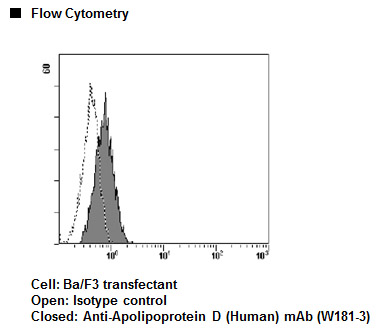Anti-Apolipoprotein D (Human) mAb
| Code | Size | Price |
|---|
| MBL-W181-3 | 100 ul | £345.00 |
Quantity:
Prices exclude any Taxes / VAT
Overview
Host Type: Mouse
Antibody Isotype: IgG2a κ
Antibody Clonality: Monoclonal
Antibody Clone: 2H11L
Regulatory Status: RUO
Target Species: Human
Application: Flow Cytometry
Shipping:
4°C
Storage:
-20°C
Images
Documents
Further Information
Applications:
FCM - 1-10 ug/mL
Background:
Apolipoprotein D, also known as ApoD, is a small glycoprotein of 29 kDa that belongs to the lipocalin superfamily of lipid transport proteins. ApoD is a component of high-density lipoprotein in human plasma. ApoD can bind cholesterol, progesterone, pregnenolone, bilirubin, and arachidonic acid. ApoD is expressed in various tissues including the liver, intestine, pancreas, kidney, placenta, adrenal glands, spleen, fetal brain tissue, as well as in tears. Increased ApoD levels in the hIPocampus and in cerebrospinal fluid serve as marker of neuropathology, including Alzheimer’s diseases. ApoD also highly exists in the cyst fluid of women with gross cystic disease of the breast, a condition associated with increased risk of breast cancer.
Formulation:
1 mg/mL in PBS/50% glycerol, pH 7.2
Gene IDs:
Human: 347
Immunogen Translated:
Human Apolipoprotein D expressed Ba/F3 transfectants generated from SST-REX (signal sequence trap by retrovirus-mediated expression screening).
Reactivity:
This antibody reacts with human
Apolipoprotein D on Flow cytometry.
Source:
This antibody was purified from hybridoma
culture supernatant by Protein A affinity column
chromatography.
Target:
Apolipoprotein D (Human)
References
1) Kojima, T. and Kitamura,T., Nat. Biotechnol. 17, 487-490 (1999)
2) Yang, C. Y., et al., Biochemistry 33, 12451-12455 (1994)
3) Peitsch, M. C. and Boguski, M. S, New Biol. 2,197-206 (1990)
4) Balb?n, M., et al., Biochem. J. 271, 803-807 (1990)



